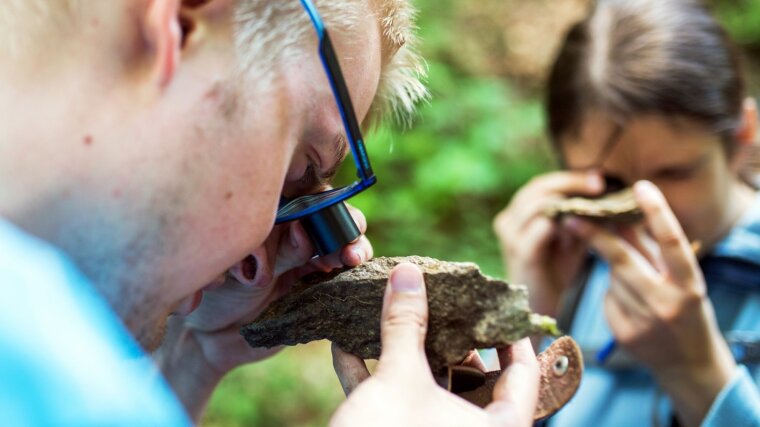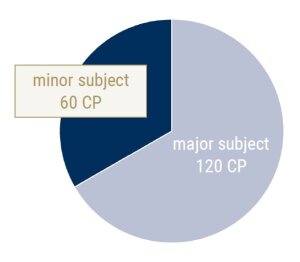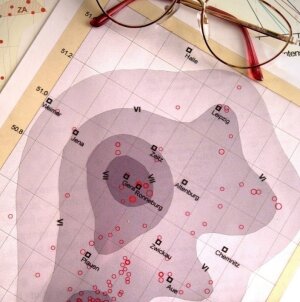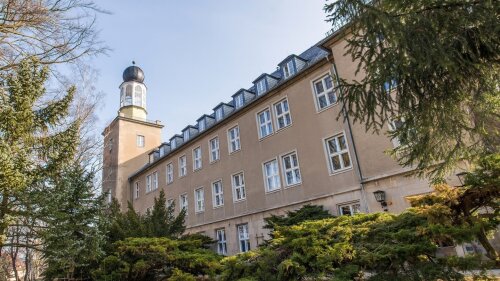
| Semester | Modules | |
| 1st | Compulsory module: Introduction to Geosciences (9 CP) |
|
| 2nd | Compulsory module: Good Scientific Practice and Scientific Conduct (3 CP) |
Required elective module: Surface Processes (7 CP) |
| 3rd | Compulsory module: Introduction to Geological Maps (6 CP) |
Required elective module: Hydrogeology (6 CP) |
| 4th | Required elective module: Structural Geology (6 CP) |
|
| 5th | Required elective module: Quaternary Geology and Soil Science (6 CP) |
Required elective module: Geochemistry and Petrology (6 CP) |
| 6th | Required elective module: Applied Geology (5 CP) |
Required elective module: Regional Geology of Central Europe (6 CP) |
Abbreviations: CP = credit points
You can choose from a wide range of required elective modules for the minor subject; 42 CP must be taken in total.
More detailed information can be found in the module catalogue for the study programme [in German]External link.
-
University entrance qualification
A university entrance qualification, such as a general secondary school leaving certificate, is required for admission onto the study programme.
More information on university entrance qualifications can be found here.
-
Language requirements
The study programme is taught in German. You must therefore have a very good command of German at the start of the study programme.
Proficiency in English is required; students must submit evidence of their language skills (except German—see above) when registering the subject of their bachelor’s thesis at the latest.
Room H310
Burgweg 11
07749 Jena
Google Maps site planExternal link
Opening hours:
by arrangement
Bachstraße 18k
07743 Jena
Telephone hours:
Mondays and Fridays (9:00 – 11:00)
Wednesdays (13:00 – 15:00)
The ASPA is primarily responsible for students in the Faculty of Social and Behavioural Sciences, the Faculty of Arts and Humanities, and the Faculty of Theology.
Postal address:
Akademisches Studien- und Prüfungsamt
Fürstengraben 1
07743 Jena
University Main Building / SSZ
Fürstengraben 1
07743 Jena
Google Maps site planExternal link
Office hours:
We offer consultations in person, by telephone, and via Zoom. You can make an appointment by calling us on +49 3641 9-411111 (Mondays to Fridays from 9:00 to 11:00) or outside these office hours on +49 3641 9-411200. You can also use our remote help desk.
Consultation hours:
Mondays, Tuesdays, Thursdays and Fridays (9:00 to 12:20), Tuesdays (14:00 to 18:00), and Wednesdays and Thursdays (14:00 to 16:00).
Video chat: To the video chat – Zoom Videochat ZeitenMondays to Fridays (12:30 to 13:00) Password ZSB2020 Data protection informationpdf, 101 kb
University Main Building, Room E065
Fürstengraben 1
07743 Jena
Google Maps site planExternal link
Opening hours:
Mondays (10:00 – 12:00)
Tuesdays (13:00 – 15:00)
Wednesdays (10:00 – 12:00)
Thursdays (13:00 – 15:00)
Fridays (10:00 – 12:00)
You can also use our remote help desk at
www.uni-jena.de/service-ssz
or send us your enquiries by post.
Telephone hours:
Mondays to Fridays
(9:00 – 11:00)
Postal address:
Friedrich-Schiller-Universität Jena
Studierenden-Service-Zentrum
07737 Jena
University Main Building
Fürstengraben 1
07743 Jena
Google Maps site planExternal link


